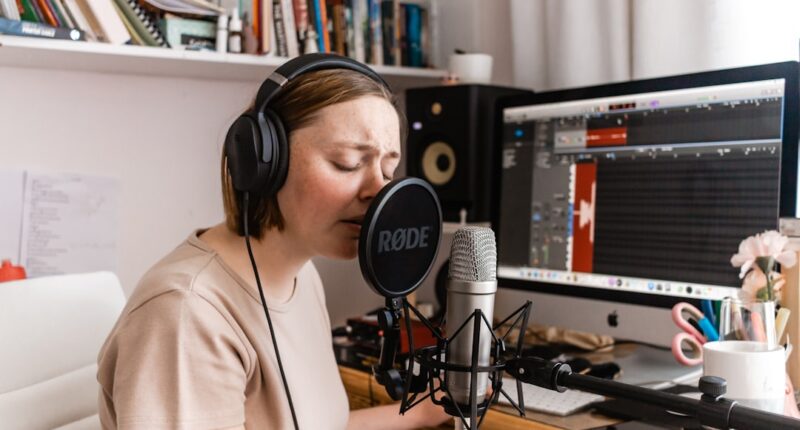The music industry is a multifaceted and dynamic sector encompassing various activities, from music creation and production to marketing and global distribution. Aspiring professionals in this field should acquire a fundamental understanding of the industry’s operations and the requirements for success as a musician or artist. A crucial component of the music industry is the music creation and production process.
This encompasses songwriting, composition, studio recording, and mixing. It also involves the contributions of producers, engineers, and other professionals who collaborate to realize musical concepts. Comprehending this process is vital for individuals pursuing a music career, as it forms the industry’s core.
Equally significant is the marketing and distribution of music to audiences. This involves developing an artist’s brand and image, as well as promoting their music through various channels, including radio, streaming platforms, and live performances. Record labels, managers, and publicists play essential roles in helping artists expand their audience and cultivate their fan base.
For newcomers to the industry, understanding effective music marketing and distribution strategies is crucial for establishing a successful career.
Key Takeaways
- The music industry is a complex and competitive field that requires a good understanding of its various components and how they work together.
- Building a strong brand is essential for new artists, and effective music marketing strategies can help them stand out in a crowded market.
- Social media is a powerful tool for music promotion, and artists should utilize platforms like Instagram, Facebook, and TikTok to connect with fans and industry professionals.
- Networking is crucial in the music industry, and building connections with other artists, producers, and industry insiders can open up new opportunities for collaboration and exposure.
- A well-crafted press kit is essential for presenting yourself to industry professionals, and should include a professional bio, high-quality photos, and samples of your music.
- Booking gigs and performing live is a key way to get your music out there, and artists should focus on building a strong live performance and seeking out opportunities to showcase their talent.
- Understanding contracts and legalities is important for protecting your music and your career, and artists should seek legal advice when negotiating deals and agreements.
Building Your Brand: Music Marketing Strategies for New Artists
Defining Your Unique Identity
First and foremost, it’s essential to define your unique identity as an artist. This involves identifying what makes you different from other musicians, whether it’s your musical style, personal story, or creative vision. Once you have a clear understanding of your identity, you can begin to develop a brand that reflects who you are as an artist.
Establishing a Strong Online Presence
Another important aspect of building your brand is creating a strong online presence. This includes having a professional website, active social media profiles, and engaging content that showcases your music and personality. Utilizing social media platforms like Instagram, Facebook, and TikTok can help you reach new fans and build a loyal following.
Consistency is Key
Additionally, creating a consistent visual aesthetic and tone of voice across all of your online platforms can help solidify your brand and make a lasting impression on your audience.
Utilizing Social Media: A Guide to Music Promotion Online

In today’s digital age, social media has become an essential tool for musicians looking to promote their music and connect with fans. Platforms like Instagram, Facebook, Twitter, and TikTok offer artists the opportunity to reach a global audience and build a loyal fan base. Understanding how to effectively utilize social media for music promotion is crucial for success in the industry.
One of the key strategies for using social media to promote your music is to create engaging and shareable content. This can include behind-the-scenes looks at your creative process, live performances, music videos, and personal updates that give fans a glimpse into your life as an artist. By creating content that resonates with your audience, you can increase engagement and grow your following on social media.
Another important aspect of utilizing social media for music promotion is to engage with your fans on a personal level. This can involve responding to comments and messages, hosting Q&A sessions, and sharing user-generated content from your fans. By building a strong connection with your audience, you can create a loyal fan base that will support you throughout your career.
Networking and Building Connections in the Music Industry
| Networking and Building Connections in the Music Industry | |
|---|---|
| Number of industry events attended | 20 |
| Number of new contacts made | 50 |
| Number of collaboration opportunities pursued | 10 |
| Number of successful collaborations | 5 |
Networking is an essential part of building a successful career in the music industry. Whether you’re an artist, producer, manager, or any other professional in the business, making connections with others in the industry can open up new opportunities and help you grow your career. There are several key strategies for networking and building connections in the music industry.
One of the most effective ways to network in the music industry is to attend industry events such as conferences, festivals, and networking mixers. These events provide valuable opportunities to meet other professionals in the business, including artists, managers, record label executives, and more. By attending these events and actively engaging with others, you can build meaningful connections that can help further your career.
Another important aspect of networking in the music industry is to utilize online platforms such as LinkedIn and professional networking groups. These platforms provide opportunities to connect with other professionals in the industry, share your work, and stay updated on industry news and trends. By actively participating in these online communities, you can expand your network and build valuable connections with others in the business.
Creating a Press Kit: How to Present Yourself to Industry Professionals
A press kit is an essential tool for artists looking to present themselves to industry professionals such as record labels, managers, booking agents, and press outlets. It serves as a comprehensive package that showcases your music, bio, photos, press coverage, and any other relevant information about you as an artist. Creating a well-crafted press kit is crucial for making a strong impression on industry professionals and getting noticed in the competitive music industry.
When creating a press kit, it’s important to include high-quality photos that capture your image as an artist. This can include professional promotional photos, live performance shots, and behind-the-scenes images that give insight into your personality and style. Additionally, including a well-written bio that highlights your musical journey, influences, and achievements can help industry professionals get to know you on a deeper level.
Another important component of a press kit is showcasing your music in a professional manner. This can include including links to your music on streaming platforms such as Spotify or Apple Music, as well as providing downloadable tracks or CDs for industry professionals to listen to. Additionally, including any press coverage or reviews of your music can help validate your work and demonstrate your credibility as an artist.
Booking Gigs and Performing Live: Tips for Getting Your Music Out There

Building Relationships in the Local Music Scene
Booking gigs and performing live is a crucial step in getting your music out there and connecting with fans. Whether you’re playing at local venues, festivals, or touring nationally or internationally, performing live can help you grow your fan base and establish yourself as a professional musician. One of the most effective strategies for booking gigs is to build relationships with venue owners, promoters, and booking agents in your local music scene. This can involve attending shows at local venues, networking with other musicians and industry professionals, and reaching out directly to venues to inquire about booking opportunities.
Creating an Engaging Live Performance
By establishing yourself as a reliable and talented performer in your local scene, you can increase your chances of booking gigs at reputable venues. Another important aspect of booking gigs is to create an engaging live performance that captivates audiences and leaves a lasting impression. This can involve rehearsing regularly with your band or backing musicians, creating a setlist that flows well and showcases your best material, and engaging with the audience in between songs.
Delivering a Memorable Performance
By delivering a memorable live performance, you can leave a positive impression on audiences and increase the likelihood of gaining new fans. This, in turn, can lead to more gig opportunities, increased exposure, and a growing fan base. By following these key tips for booking gigs and performing live, new artists can set themselves up for success in this crucial aspect of their career.
Navigating Contracts and Legalities: Protecting Your Music and Your Career
Navigating contracts and legalities is an important aspect of protecting your music and your career as an artist. Whether you’re signing with a record label, working with a manager or booking agent, or collaborating with other musicians or songwriters, understanding the legal aspects of the music industry is crucial for safeguarding your rights and ensuring fair treatment. There are several key considerations when it comes to navigating contracts and legalities in the music industry.
One of the most important aspects of navigating contracts is seeking legal counsel from an experienced entertainment attorney. A lawyer who specializes in music law can provide valuable guidance when it comes to reviewing contracts, negotiating terms, and ensuring that your rights are protected. Whether you’re signing a record deal, licensing agreement, or collaboration agreement, having legal representation can help you navigate complex legal language and make informed decisions about your career.
Another important consideration when navigating contracts in the music industry is understanding the terms and conditions of any agreements you enter into. This includes understanding royalty rates, publishing rights, ownership of master recordings, performance rights, and any other financial or legal implications of the contract. By having a clear understanding of these terms, you can ensure that you’re being fairly compensated for your work and that your rights are being protected.
In conclusion, breaking into the music industry as a new artist requires a combination of talent, hard work, perseverance, and strategic planning. By understanding the inner workings of the industry, building a strong brand, utilizing social media effectively for promotion, networking with industry professionals, creating a professional press kit, booking gigs and performing live effectively while navigating contracts and legalities carefully will set new artists on the path to success in their musical careers.
If you’re looking to break into the music industry, you might want to check out this article on musicpromotion.tech. The article discusses the importance of building a strong online presence and utilizing social media to promote your music. It offers valuable tips and strategies for independent artists looking to gain exposure and grow their fan base. Check out the article here for some helpful insights on music promotion.
FAQs
What is the music industry?
The music industry encompasses the businesses and individuals that create, produce, promote, and distribute music. This includes artists, record labels, music publishers, concert promoters, and streaming platforms.
How can I break into the music industry?
Breaking into the music industry requires talent, dedication, and hard work. It’s important to develop your skills as a musician, build a strong online presence, network with industry professionals, and seek opportunities to perform and showcase your music.
What are some common ways to get noticed in the music industry?
Some common ways to get noticed in the music industry include performing live shows, releasing high-quality recordings, building a strong social media presence, collaborating with other artists, and seeking representation from a reputable music manager or agent.
What are some challenges of breaking into the music industry?
Some challenges of breaking into the music industry include intense competition, the need for financial investment in recording and promotion, the difficulty of getting noticed by industry professionals, and the demands of maintaining a successful career in a highly competitive field.
What are some key skills and qualities needed to succeed in the music industry?
Key skills and qualities needed to succeed in the music industry include musical talent, creativity, perseverance, strong work ethic, the ability to collaborate with others, business acumen, and a willingness to adapt to the constantly evolving music landscape.
What are some important tips for aspiring musicians looking to break into the music industry?
Some important tips for aspiring musicians looking to break into the music industry include honing your craft, building a strong online presence, networking with industry professionals, seeking feedback and mentorship, and staying persistent and resilient in the face of challenges.





